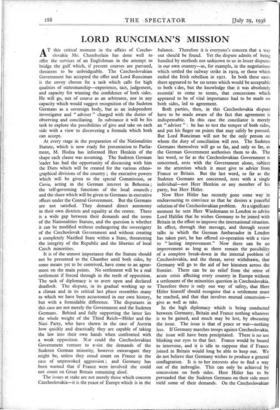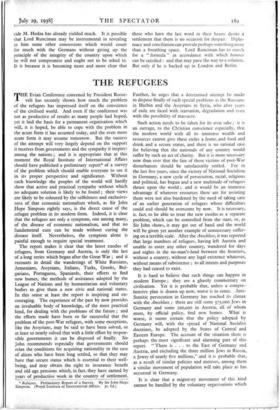LORD RUNCIMAN S MISSION
AT this critical moment in the affairs of Czecho- slovakia Mr. Chamberlain has done well to offer the services of an Englishman in the attempt to bridge the gulf which, if present courses are pursued, threatens to be unbridgeable. The Czechoslovakian Government has accepted the offer and Lord Runciman is the envoy chosen for a task which calls for high qualities of statesmanship—experience, tact, judgement, and capacity for winning the confidence of both sides. He will go, not of course as an arbitrator, nor in any capacity which would suggest recognition of the Sudeten Germans as a sovereign body, but as an independent investigator and " adviser " charged with the duties of observing and conciliating. In substance it will be his task to explore the possibilities of give and take on each side with a view to discovering a formula which both can accept.
At every stage in the preparation of the Nationalities Statute, which is now ready for presentation to Parlia- ment, M. Hodza has informed Herr Henlein of the shape each clause was assuming. The Sudeten German leader has had the opportunity of discussing with him the Diets which will be created for the various ethno- graphical divisions of the country ; the executive powers which will be given to the special Commission, or Curia, acting in the German interest in Bohemia ; the lelf-governing functions of the local councils ; and the share which will be given to Germans in executive offices under the Central Government. But the Germans are not satisfied. They demand direct autonomy in their own districts and equality at the centre. There is a wide gap between their demands and the terms of the Nationalities Statute, and the question is whether it can be modified without endangering the sovereignty of the Czechoslovak Government and without creating a completely Nazified State within a State, threatening the integrity of the Republic and the liberties of local Czech minorities.
It is of the utmost importance that the Statute should not be presented to the Chamber until both sides, by some means yet to be contrived, have come to an agree- nient on the main points. No settlement will be a real settlement if forced through in the teeth of opposition. The task of diplomacy is to avert open and declared deadlock. The dispute, in its gradual working up to a climax and in its critical last phase resembles many to which we have been accustomed in our own history, but with a formidable difference. The disputants in this case are not merely the Government and the Sudeten Germans. Behind and fully supporting the latter lies the whole weight of the Third Reich—Hitler and the Nazi Party, who have shown in the case of Austria how quickly and drastically they are capable of taking the law into their own hands ' when confronted with a weak opposition. Nor could the Czechoslovakian Government venture to r( sist the demands of the Sudeten German minority, however extravagant they might be, unless they could count on France in the case of unprovoked aggression ; and Germany has been warned that if France were involved she could not count on Great Britain remaining aloof.
The issues at stake are not merely those which concern Czechoslovakia—it is the peace of Europe which is in the . balance. Therefore it is everyone's concern that a way out should be found. Yet the dispute admits of being handled by methods not unknown to us in lesser disputes in our own country—as, for example, in the negotiations which settled the railway strike in 1919, or those which ended the Irish rebellion in 1921. In both these cases there appeared to be no terms which would be acceptable to both saes, but the knowledge that it was absolutely essential to come to terms, that concessions which appeared to be of vital importance had to be made on both sides, led to agreement.
Both parties, then, in this Czechoslovakia dispute have to be made aware of the fact that agreement is indispensable. In this case the conciliator is merely an " adviser " : he has to test the temper of both sides, and put his finger on points that may safely be pressed. But Lord Runciman will not be the only person on whom the duty of conciliation will rest. The Sudeten Germans themselves will go so far, and only so far, as the German Government authorises them to do. The last word, so far as the Czechoslovakian Government is concerned, rests with the Government alone, subject to the attention which it must give to advice from France or Britain. But the last Word, so far as the Sudeten Germans are concerned, rests with a single individual—not Herr Henlein or any member of his party, but Herr Hitler. - Now Herr Hitler has recently gone some 'way in endeavouring to convince us that he desires a peaceful solution of the Czechoslovakian problem. At a significant moment he sent Herr Wiedemann to London to advie Lord Halifax that he wishes Germany to be joined with Britain in the effort to improve the international situation. In effect, through that message, and through. recent talks in which the German Ambassador in London has taken part, he has offered co-operation with a view to " lasting improvement." Now there can be no improvement as long as there remain the possibility of a complete break-down in the internal problem of Czechoslovakia, and the threat, never withdracin, that Germany will go to the aid of her kinsrhen across the frontier. There can be no relief from the sense of acute crisis affecting every country in Europe without a settlement of the minorities question in Czechoslovakia. Therefore there is only one way of safety, that Herr Hitler himself should recognise that a settlement must be reached, and that that involves mutual concession— give as well as take.
In the high diplomacy which is being conducted between Germany, Britain and France nothing whatever is to be gained, and much may be lost, by obscuring the issue. The issue is that of peace or war—nothing less. If Germany marches troops against Czechoslovakia, the issue will have been precipitated. There is no use blinking our eyes to that fact. France would be bound to intervene, and it is idle to suppose that if France joined in Britain would long be able to keep out. We do not believe that Germany wishes to produce a general conflagration. It is to her interests also to find a way out of the imbroglio. This can only be achieved by concessions on both sides: Herr Hitler has to be persuaded that the Sudeten Germans on their side must yield some of their demands. On the Czechoslovakian side M. Hodza has already yielded much. It is possible that Lord Runciman may be instrumental in revealing to him some other concessions which would count for much with the Germans without giving up the principle of the integrity of the country upon which he will not compromise and ought not to be asked to. It is because it is becoming more and more clear that those who have the last word in their hearts desire a settlement that there is no occasion for despair. Diplo- macy and conciliation can provide perhaps something more than a breathing space. Lord Runciman has to search for a " formula " in accordance with which honour can be satisfied : and that may pave the way to a solution. But only if he is backed up in London and Berlin.



































 Previous page
Previous page